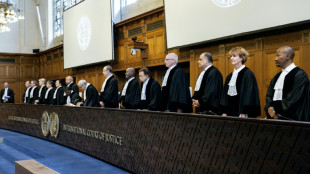
-
 British MPs debate contentious assisted dying law
British MPs debate contentious assisted dying law
-
Macron offers first glimpse of post-fire Notre Dame

-
 Syria jihadists, allies shell Aleppo in shock offensive
Syria jihadists, allies shell Aleppo in shock offensive
-
Japan government approves $92 bn extra budget

-
 Toll in Syria jihadist-army fighting rises to 242: monitor
Toll in Syria jihadist-army fighting rises to 242: monitor
-
UK transport secretary quits in setback for Starmer

-
 Days before deadline, plastic treaty draft highlights disagreement
Days before deadline, plastic treaty draft highlights disagreement
-
Crypto boss eats banana art he bought for $6.2 million

-
 Teen news boss criticises Australian social media ban
Teen news boss criticises Australian social media ban
-
Taiwan detects 41 Chinese military aircraft, ships ahead of Lai US stopover

-
 Spain urged to 'build differently' after deadly floods
Spain urged to 'build differently' after deadly floods
-
WTO chief faces heavy task as Trump threat looms

-
 Herbert takes control at Australian Open as Smith tanks
Herbert takes control at Australian Open as Smith tanks
-
Israel PM again warns Iran after top diplomat talks of revising nuclear doctrine

-
 Brilliant Brook's 132 puts England on top against sloppy New Zealand
Brilliant Brook's 132 puts England on top against sloppy New Zealand
-
Brilliant Brook's 132 puts England on top against New Zealand

-
 US landmine offer to Ukraine throws global treaty into 'crisis': campaign group
US landmine offer to Ukraine throws global treaty into 'crisis': campaign group
-
Singapore hangs 4th person in three weeks

-
 Five things to know about NewJeans' shock split from agency
Five things to know about NewJeans' shock split from agency
-
Waste pickers battle for recognition at plastic treaty talks

-
 Ireland votes in closely fought general election
Ireland votes in closely fought general election
-
Top UN court to open unprecedented climate hearings

-
 European countries that allow assisted dying
European countries that allow assisted dying
-
British MPs to debate contentious assisted dying law

-
 Schmidt not expecting hero's welcome on Ireland return
Schmidt not expecting hero's welcome on Ireland return
-
PSG stuck between domestic dominance and Champions League woes

-
 'Hot fight' as unbeaten Bayern visit Dortmund fortress
'Hot fight' as unbeaten Bayern visit Dortmund fortress
-
Bordeaux-Begles' Samu 'not finished yet' with Wallabies

-
 Brook and Pope half-centuries haul England to 174-4 against NZ
Brook and Pope half-centuries haul England to 174-4 against NZ
-
Yen rallies on rate hike bets as equity markets swing

-
 Ukraine superstar Mahuchikh brings 'good vibes' to her war-torn country
Ukraine superstar Mahuchikh brings 'good vibes' to her war-torn country
-
PlayStation at 30: How Sony's grey box conquered gaming

-
 Saudi Arabia hosts UN talks on drought, desertification
Saudi Arabia hosts UN talks on drought, desertification
-
PlayStation: Fun facts to know as Sony's console turns 30

-
 Nepal's first transgender candidates run for local office
Nepal's first transgender candidates run for local office
-
Father of PlayStation says 'everyone told us we would fail'

-
 Ireland seek to overcome former coach Schmidt's Wallabies
Ireland seek to overcome former coach Schmidt's Wallabies
-
Detroit survive Bears comeback to make it 10 wins in a row

-
 Mexican actor Silvia Pinal dead at 93
Mexican actor Silvia Pinal dead at 93
-
'Black Friday' deals target inflation-weary US consumers

-
 Liverpool look to deepen Man City crisis, Amorim seeks first Premier League win
Liverpool look to deepen Man City crisis, Amorim seeks first Premier League win
-
Police fire rubber bullets, tear gas at Georgia protesters after PM delays EU bid

-
 England lose three quick wickets in reply to New Zealand's 348
England lose three quick wickets in reply to New Zealand's 348
-
Social media companies slam Australia's under-16 ban

-
 Police fire tear gas at Georgia protesters after PM delays EU bid
Police fire tear gas at Georgia protesters after PM delays EU bid
-
Canada watchdog sues Google over 'anti-competitive' ad tech

-
 Hojlund gives Amorim winning Old Trafford bow, Roma hold Spurs
Hojlund gives Amorim winning Old Trafford bow, Roma hold Spurs
-
Amorim wins first Man Utd home game after rollercoaster ride

-
 France arrests 26 as South Asian migrant trafficking ring smashed
France arrests 26 as South Asian migrant trafficking ring smashed
-
At least 15 dead, 113 missing, in Uganda landslides


Hong Kong court convicts five of sedition over children's books
Five Hong Kong unionists were found guilty of sedition on Wednesday for producing a series of illustrated children's books that portrayed the city's democracy supporters as sheep defending their village from wolves.
The convictions are the latest using a colonial-era sedition offence which authorities have deployed alongside a new national security law to stamp out dissent.
The prosecution focused on members of a speech therapists' union who produced three illustrated e-books aimed at explaining Hong Kong's democracy movement to children.
In one book, called "Defenders of the Sheep Village", a group of wolves try to occupy a village of sheep, who fight back and drive their attackers away.
In another, the wolves are portrayed as dirty and bringing disease to the sheep's village.
Lai Man-ling, Melody Yeung, Sidney Ng, Samuel Chan and Fong Tsz-ho, all founding members of the union, were charged with sedition and held in jail for more than a year ahead of their verdict.
After a two-month trial Kwok Wai-kin, a District Court judge handpicked by the government to try national security cases, found the five guilty of conspiring to spread seditious content.
"The seditious intention stems not merely from the words, but from the words with the proscribed effects intended to result in the mind of children," Kwok wrote in his judgement.
"Children will be led into belief that the PRC (People's Republic of China) Government is coming to Hong Kong with the wicked intention of taking away their home and ruining their happy life with no right to do so at all," he added.
- 'Unrelenting repression' -
Amnesty International, which recently left Hong Kong because of the national security law, described the convictions as "an absurd example of unrelenting repression".
"Writing books for children is not a crime, and attempting to educate children about recent events in Hong Kong's history does not constitute an attempt to incite rebellion," Amnesty's China campaigner Gwen Lee said.
During the trial, prosecutors argued the books contained "anti-China sentiment" and were aimed at "inciting readers' hatred against the mainland authorities".
They also said the books were meant to encourage Hong Kongers to discriminate against "mainland Chinese people living in Hong Kong".
The defence argued that the sedition offence was vaguely defined and that each reader should be allowed to make up their own mind about what the characters in the books represent.
They also warned that a guilty verdict would further criminalise political criticism and have a chilling effect on society.
- Political crackdown -
Until recently Hong Kong was a bastion of free expression within China and home to a vibrant and outspoken publishing industry.
But Beijing has unleashed a sweeping political crackdown on the city in response to huge and sometimes violent democracy protests three years ago.
Sedition was originally a law from the British colonial era and carries a sentence of up to two years in prison.
Until recently, it had not been used for decades.
But it has been embraced by police and prosecutors over the last two years, alongside the national security law which Beijing imposed on Hong Kong in 2020.
Since then the city's once-popular democracy movement has been dismantled.
Most prominent local democracy activists either are in jail, are awaiting trial or have fled overseas.
Dozens of civil society groups, including multiple trade unions, have folded while a mainland-style censorship rule has been created for the film industry.
Books have been removed from libraries and curriculums rewritten with authorities ordered to instil patriotism into the city's children.
Only people deemed "staunch patriots" are now allowed to run for office.
Even before the latest crackdown, publishing had become a key target for Chinese authorities.
In 2015, five Hong Kong publishers behind a bookstore that put out salacious tomes on leaders of the Chinese Communist Party went missing, later reappearing in mainland custody.
The missing bookseller case was itself a partial catalyst for the 2019 democracy protests, which began as a movement against a law allowing extraditions to the mainland's party-controlled court system.
F.Müller--BTB
